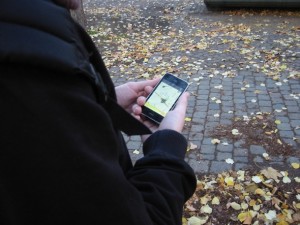By Doug Stephens
A recent study by Forrester Research concluded that while location-based services (LBS) such as Foursquare, Gowalla and Loopt are intriguing, they are still too small for major marketers to spend much time on. Location-based services allow users to not only share their physical location with others but also to gather and receive information relative to their location such as reviews, recommendations, other nearby venues and friends that may be in proximity. Forester added that while current users of location-based services are very likely to be influencers within their social circles, they are also largely male and therefore better suited to marketers targeting men. Their overall advice to marketers was a resounding “wait-and-see” on location-based services.
their location such as reviews, recommendations, other nearby venues and friends that may be in proximity. Forester added that while current users of location-based services are very likely to be influencers within their social circles, they are also largely male and therefore better suited to marketers targeting men. Their overall advice to marketers was a resounding “wait-and-see” on location-based services.
Then Why So Much Location-Based Marketing?
But it’s hard to reconcile the Forester report with a lot of what’s happening in the marketplace. Large players like Starbucks have been experimenting with services like Foursquare since early 2010, giving in-store discounts and rewards to users for checking in to their stores. The GAP recently launched a one-day 25% off promotion to Foursquare users checking-in at GAP locations. Add to the list the Wynn Las Vegas Hotel, the City of Chicago and Tasti D-Lite and it would appear that location-based marketing is being taken very seriously by major marketers across categories. And it all seams completely understandable. After all, isn’t the goal of marketing to be timely and relevant? It would seem that LBS is an ideal means of achieving both.
Recently released LB applications such as the Shopkick are making news by taking shopper rewards to entirely new and location-specific levels, literally allowing shoppers to earn rewards simply for moving through various areas of a participating store. And with retail giants such as Macy’s, Best Buy, Sports Authority and American Eagle Outfitters and Simon Property Group testing it, Shopkick is getting some serious attention.
And in what is perhaps the ultimate sign that LBS has arrived, Facebook recently launched its own home-grown location service, Facebook Places, allowing users to share not only what they’re doing but also where they’re doing it.
All this activity and interest around LBS begs the question, if in fact marketers follow Forester’s advice and wait on the sidelines, do they run the risk of missing the “LB boat” entirely?
Making Location Make Sense
What most agree on is that location-based marketing services are still relatively new to the mainstream and largely misunderstood by the public and marketers alike. To that end, organizations are forming to foster discussion, education and understanding about LBS. One such organization, the Location-Based Marketing Association of Canada hopes to not only better define LBS but also share with marketers the unique opportunities the technology represents.
In response to the Forester study, Association Founder and President Asif Khan said “What they failed to highlight was the explosive recent growth of such services. Foursquare alone has over 2.5 million users and has experienced 28% growth in just the last month, according to RJ Metrics. More and more people are beginning to utilize location-based services and as Smartphone adoption increases globally, the numbers will only continue to increase.” Khan also points to the introduction of Facebook Places as having the potential to immediately introduce upwards of 500 million users to the concept of location based services.
As for marketers considering location-based marketing, Khan believes that those who “move to embrace LBS early-on will reap enormous rewards from proximity marketing, including attracting more first-time customers, encouraging more repeat business and increasing sales. I also see huge opportunities for cross-brand promotion for companies that have multiple brands like Gap and Old Navy.”
Forget technology. It’s about “return on relationships”
Techno-Anthropologist Clay Shirky is quoted as saying that “Communications tools don’t get socially interesting until they get technologically boring.” To that end, Khan sees the use of LB reaching critical mass in 18-24 months. “I think Clay is right” said Khan. “I don’t think it’s about technology at all. At least, I don’t think people care about which app they use. They only care about the size and relevance of the deal. For brands and retailers engaging with these tools, the real measurement of success will not only be ROI, but Return on Relationship (ROR).
As for the future and the continued evolution of location-based technologies, Khan suggests that the very context in which we consider the term location will also evolve. “Today, we think of location as only the physical space. But I see a time where we will be in virtual spaces and augmented reality where brands and content will live as well.”
Full disclosure: Retail Prophet Consulting sits as a current member of the advisory board for the Location-Based Marketing Association of Canada.

